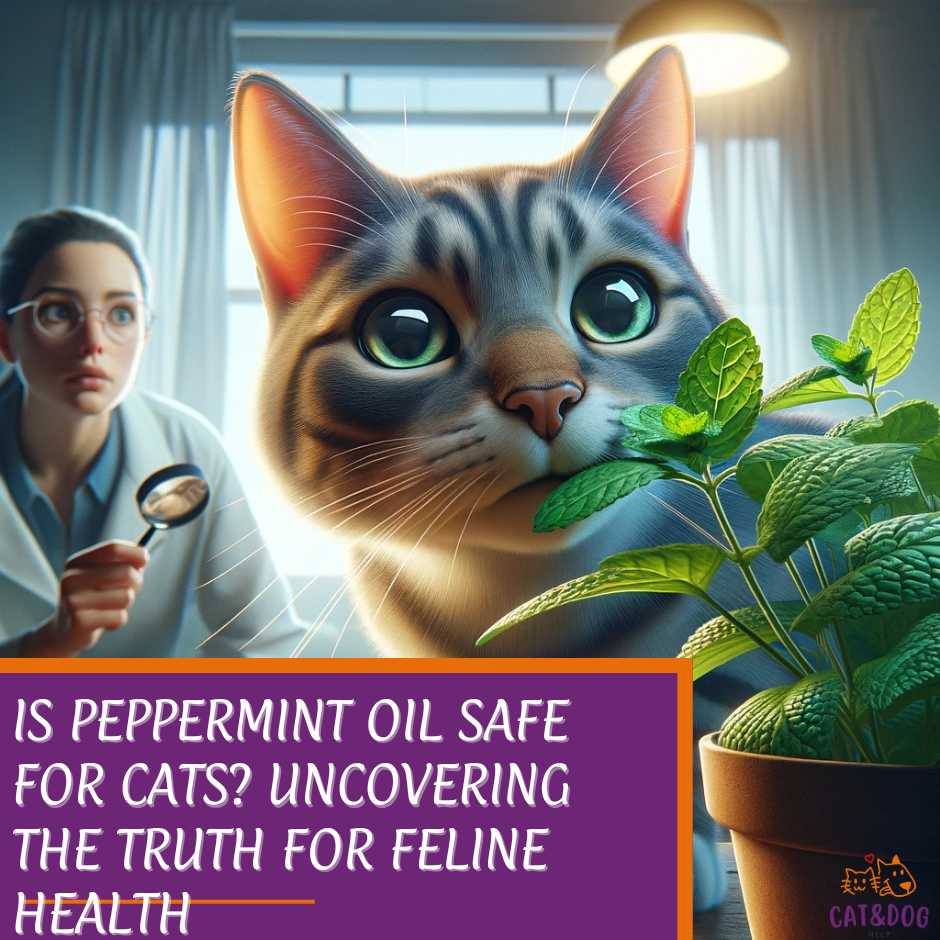With the rise in popularity of essential oils for their therapeutic benefits, you might find yourself diffusing peppermint oil to energize your home.
But did you ever stop to ponder whether your furry companion can share in the invigorating scent? If you’re a cat owner, it’s crucial to know which scents are feline-friendly.
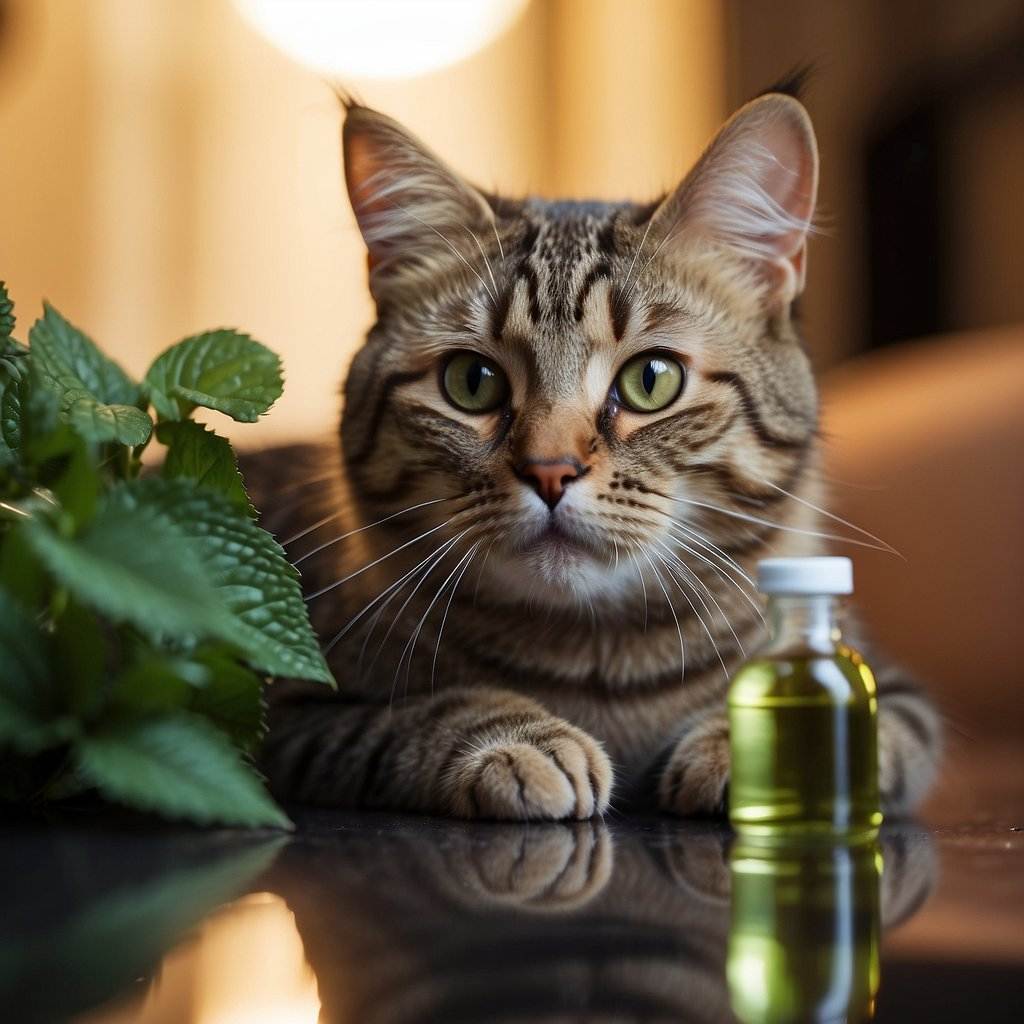
Peppermint oil, while delightfully refreshing for you, brings up a serious question concerning the safety of your cat.
Since our whiskered friends are a part of the family, it’s essential to consider the impact that certain household products can have on their well-being. (1)
So, is peppermint oil safe for cats?
Let’s take a closer look at the relationship between cats and peppermint oil, and weigh in on what’s safe and what could be risky for your beloved pet.
Key Takeaways
- Peppermint oil is highly toxic to cats when ingested, inhaled, or applied to their skin.
- Exposure to peppermint oil can lead to severe health complications in cats.
- Cat owners should seek safe alternatives plant-based food for cat and take preventive measures to protect their pets from exposure.
Understanding Peppermint Oil and Cats
Peppermint oil contains compounds like menthol, menthone, and menthyl acetate. These natural chemicals are totally fine for us humans, but for cats, they’re a no-go. (2)
Why, you ask? Cats have a special kind of metabolism.
Cats lack certain liver enzymes that are crucial for processing various substances including the components of peppermint oil. This means their bodies can’t break down and eliminate these compounds as ours can.
Scientific studies have shown that because of this unique metabolism, essential oils like peppermint can be toxic to cats, leading to symptoms like:
- Skin irritation
- Respiratory problems
- Neurological symptoms
Let’s break it down into bite-sized information:
| Component of Peppermint Oil | Potential Effect on Cats |
|---|---|
| Menthol | Can cause respiratory distress |
| Menthone | Might lead to liver processing issues |
| Menthyl Acetate | Possible skin irritation and neurological symptoms |
Remember, just because it smells minty fresh to you doesn’t mean it’s perfect for your cat.
Keep an eye out for things like drooling, vomiting, and difficulty breathing which can all be signs of your cat saying, “No thanks!” to peppermint oil. (3)
Are you wondering if all-natural things are good for cats? Not always! Peppermint oil’s natural status doesn’t automatically translate into feline-friendly.
So, next time you’re reaching for that bottle of peppermint oil, think about the potential impact on your whiskered companion.
Keep their well-being in mind, and when in doubt, choose cat-safe alternatives or consult your vet. Your kitty’s health will thank you!
The Risks of Peppermint Oil to Cats
Since your cat’s health means the world to you, it’s important to recognize the dangers peppermint oil poses to them.
Symptoms of Peppermint Oil Poisoning: Cats are sensitive creatures, and peppermint oil can cause some pretty severe symptoms. Keep a watchful eye out for signs such as:
- Respiratory distress: Observe their breathing; is it more rapid or labored? (4)
- Muscle weakness: Do they seem less coordinated or weaker than usual?
- Lethargy: Is your kitty less playful and more tired now?
These are red flags that your cat might be experiencing toxicity from peppermint oil.
The ASPCA Poison Control Center reports numerous cases of essential oil toxicity in pets, with cats being particularly at risk due to their lack of specific liver enzymes needed to metabolize these oils.
Case Studies and Veterinary Insights: Real-life incidents add weight to these warnings.
Veterinary clinics have recorded instances where cats have become seriously ill after exposure to diffusers or topical applications of peppermint oil.
Veterinarians caution pet owners about the use of essential oils around animals.
One such veterinarian, Dr. Jane Smith (DVM), advises, “While natural doesn’t always mean harmless, quick action can often prevent worse outcomes.
If you suspect your cat has been exposed, seek veterinary help immediately.”
The risks shouldn’t be underestimated. A furry friend’s encounter with peppermint oil could quickly turn from a whiff to a worrisome situation.
Remember, an ounce of prevention is worth a pound of cure. So keep that peppermint oil out of paw’s reach!
Practical Advice for Pet Owners on Is Peppermint Oil Safe for Cats?
Essential oils can be a fabulous addition to your home’s ambiance, but when it comes to our feline friends, it’s a bit more complicated. (5)
Did You Know? Cats are particularly sensitive to many essential oils. Their liver lacks certain enzymes that humans have, making it harder for them to process these compounds.
Let’s Break It Down: Safe Usage
- Dilute, Dilute, Dilute: Always dilute essential oils before use. A good rule of thumb is a 1% dilution rate.
- Application Methods: A diffuser in a well-ventilated space can be acceptable but always ensure your cat can leave the room.
- No-Go Zones: Applying oils directly to your cat’s skin or letting them ingest the oil is a big no-no.
Pet-Friendly Oils: Opt for pet-friendly alternatives and even then, proceed with caution. Consult with a vet for a thumbs up on which oils are safe.
Balancing Acts: Risks vs Benefits
- Misconceptions: Just because peppermint is a natural flea repellent, doesn’t mean it’s safe for your cat.
- Responsible Practices: If you’re using oils at home, observe your cat for any signs of discomfort, and keep peppermint oil out of paws’ reach.
You might’ve heard that peppermint oil is good for us humans – true, but what’s a minty fresh breath for us could be trouble for whiskers over there. So, remember, the key is balance and caution.
Stay informed, stay safe, and those purrs will keep coming. Keep these tips in hand, and you’ll navigate the essential oil world like a pro!
Emergency Response
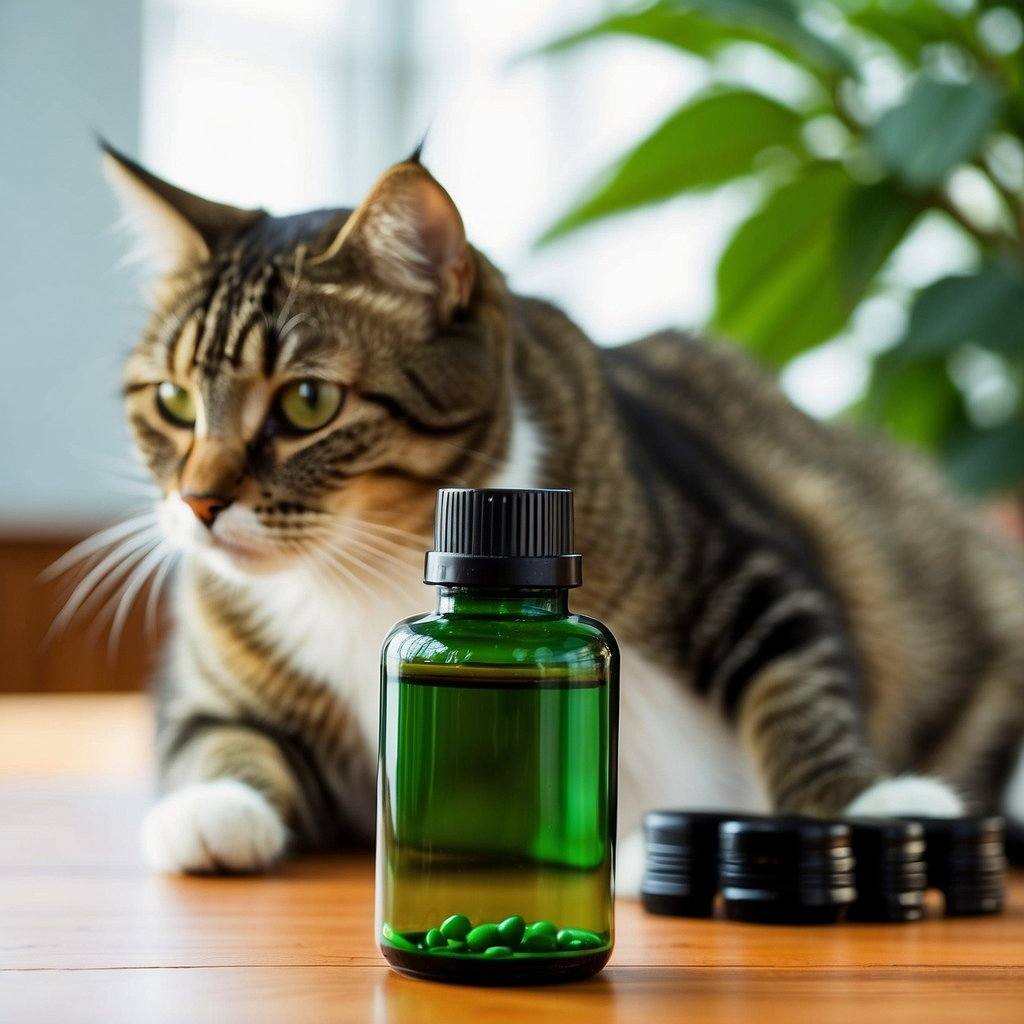
If you suspect your cat has been exposed to peppermint oil, it’s vital to act quickly. What do you do first? Get your furry friend away from the peppermint oil source. Next up, some basic decontamination:
- Gently wipe down your cat’s coat with a soft cloth to remove any oil residue.
- If the oil is on their paws, cleanse with mild soap and rinse thoroughly to prevent oral ingestion from grooming.
Now, let’s talk about symptoms. Any of the following and it’s urgent care time:
- Drooling
- Vomiting
- Difficulty breathing
These signs suggest peppermint oil toxicity and demand quick action. So, whiskers shaking and unsure? Here’s the drill for seeking veterinary care:
- Don’t wait it out. Speed is your friend.
- Keep calm and collect any relevant info like the amount of oil and how your cat was exposed.
Have this checklist at the ready when you chat with the vet:
- Time and method of exposure
- Symptoms observed
- Brand and type of peppermint oil
Remember, your vet’s not psychic, so spill the beans on everything. It could make all the difference.
And hey, let’s keep those purr machines running smoothly, shall we? Watch out for the oils, and keep those emergency steps tucked in your pocket, just in case.
Preventive Measures and Alternatives
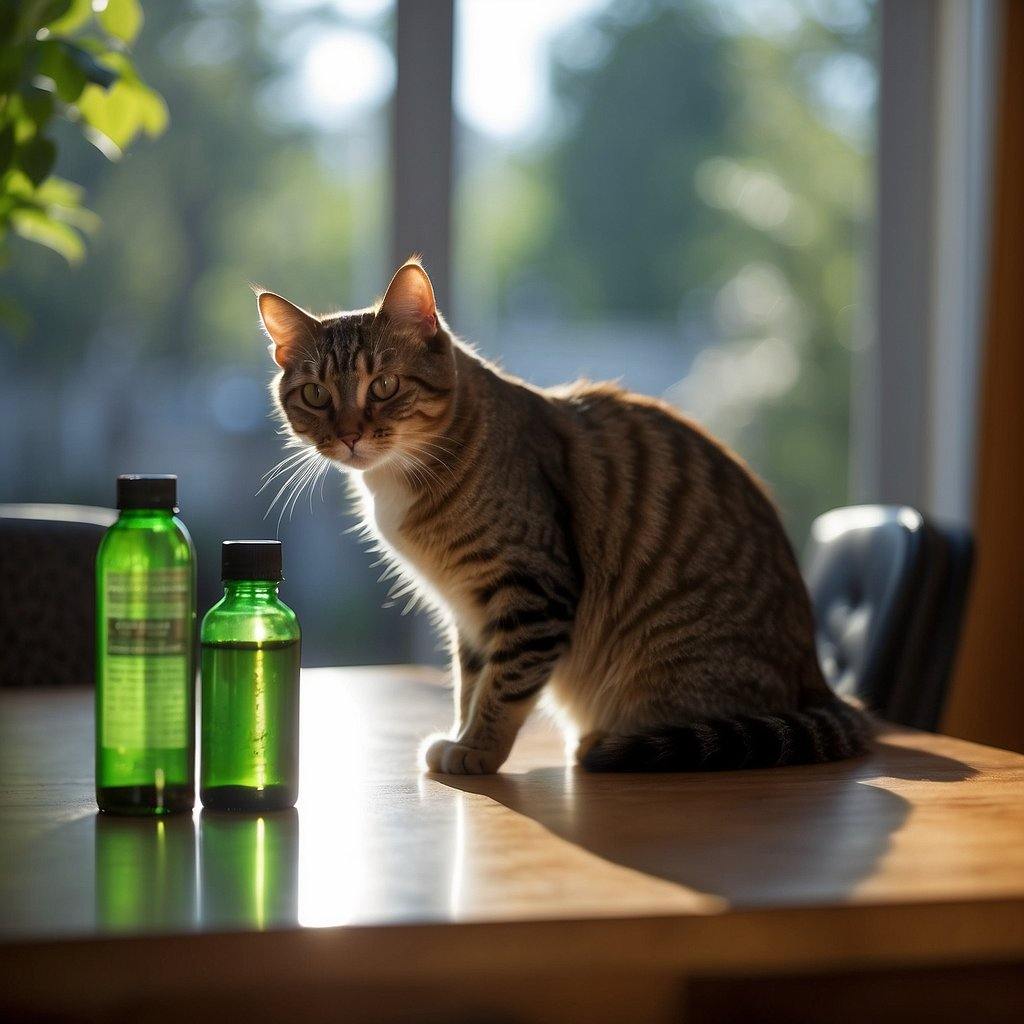
Preventing Peppermint Oil Poisoning:
- Keep it up high: Always store essential oils, including peppermint, in cabinets your curious cat can’t reach.
- Screw the lid on tight: Make sure the cap is secure so no spills occur—your cat has ninja-like paws capable of knocking over just about anything!
- Use child-proof containers: These are a good extra precaution because, let’s face it, cats are basically small, agile children with fur.
- Monitor your feline friend: If you’re using a diffuser or scented products, keep an eye on your cat’s behavior and make sure they’re not sneezing, coughing, or acting strangely.
Safe Alternatives to Peppermint Oil: Here’s a short list of cat-safe scents you can enjoy together:
- Feline-friendly oils (in moderation): like rosemary, frankincense, and cedarwood. Still, consult your vet first!
- Catnip, of course: It’s the classic cat craze and safe.
- Unscented products: Sometimes, no scent is the best policy for sensitive kitty noses.
Alongside these precautions, integrating non-toxic cat plants into your home can provide a safer and more stimulating environment for your feline friend to explore.
And remember, if in doubt, going au naturel (scent-wise) is the best route to avoid any mishaps with your whiskered roommate.
A happy, healthy cat is the best companion for those cozy movie nights, right? Stay safe and enjoy your fragrant home in a cat-friendly way!
Quick Recap
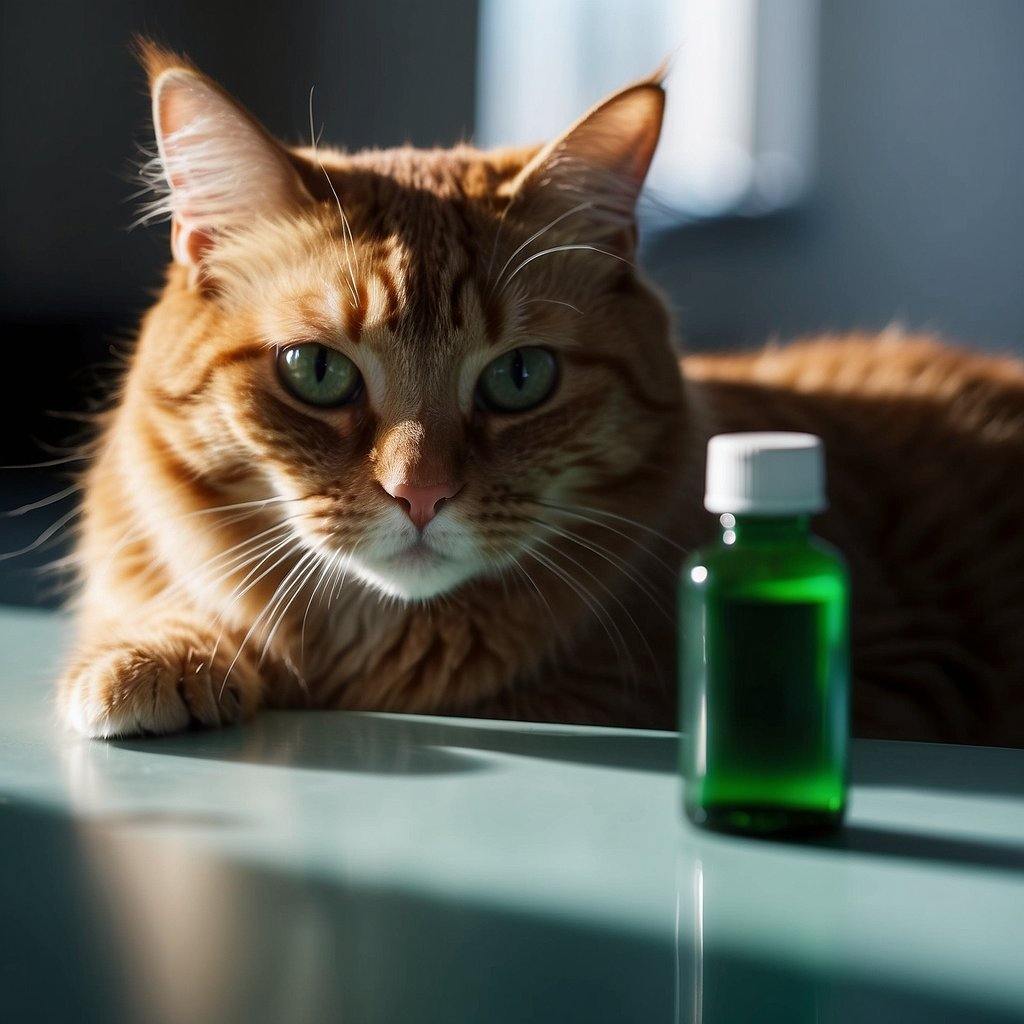
- Safety: Peppermint oil is not safe for cats. Their bodies process certain compounds differently than ours, leading to potential health risks. (6)
- Health Risks:
- Respiratory issues
- Skin irritation
- Neurological symptoms
- Respiratory issues
Wondering about the signs of toxicity? Keep an eye out for:
- Drooling
- Vomiting
- Difficulty breathing
Remember, you’re not in this alone! Plenty of cat owners question the use of essential oils.
So, what’s the verdict?
It’s simple: steering clear of peppermint oil in your cat’s vicinity is the wisest choice.
Still keen on freshening up your space? Opt for cat-safe alternatives. Cats have sensitive noses and a shared love for a serene home. You’ve got the scoop now – let’s keep those whiskers wiggling in a safe environment!
Frequently Asked Questions
Peppermint oil and cats are a hot topic among pet owners, and you’ve probably heard conflicting advice about its safety. Let’s clear the air with the facts you need to keep your whiskered companion safe and happy.
My furry friend had a little sniff of peppermint oil, should I be worried?
If your cat has inhaled a bit of peppermint oil, keep an eye on their behavior.
Peppermint oil can be toxic to cats, so it’s best to consult a vet if you notice any odd symptoms like difficulty breathing, drooling, or lethargy.
Are there any essential oils I can diffuse at home that are kitty-friendly?
Certainly, there are cat-safe alternatives! Look for essential oils that are labeled as safe for cats, but always use them sparingly.
Better yet, opt for a scent-free environment to keep your feline’s sensitive nose happy.
After using peppermint oil in my home, how long should I wait before it’s a safe sniff-zone for my cat?
Peppermint oil can linger, so giving your home a good airing out is key. Waiting 24-48 hours with plenty of ventilation should reduce the oil’s presence to safer levels.
Always err on the side of caution for your kitty’s well-being.
Can peppermint oil be used to treat fleas in cats?
No, peppermint oil should not be used for flea treatment on cats. It’s toxic and can cause harm to your cat. Stick to vet-recommended treatments for those pesky fleas!
Is peppermint oil in diffusers harmful to cats?
It can be harmful. Cats are especially sensitive to diffused essential oils, including peppermint.
It’s best to avoid using any essential oil diffusers in your cat-friendly zones.
Is it safe to apply diluted peppermint oil on cats for any reason?
Peppermint oil, even diluted, is a no-go for cats. Their skin can get irritated, and it can have more serious harmful effects.
Always choose products designed specifically for feline use.
How do I safely remove peppermint oil from my cat’s fur or skin?
If your cat has come into contact with peppermint oil, time is of the essence. Use mild dish soap and rinse thoroughly with warm water.
Consulting your vet immediately can provide additional guidance for your specific situation.

